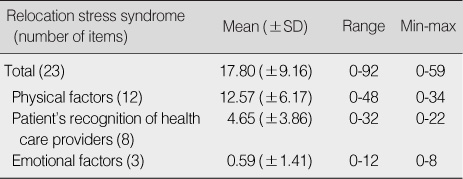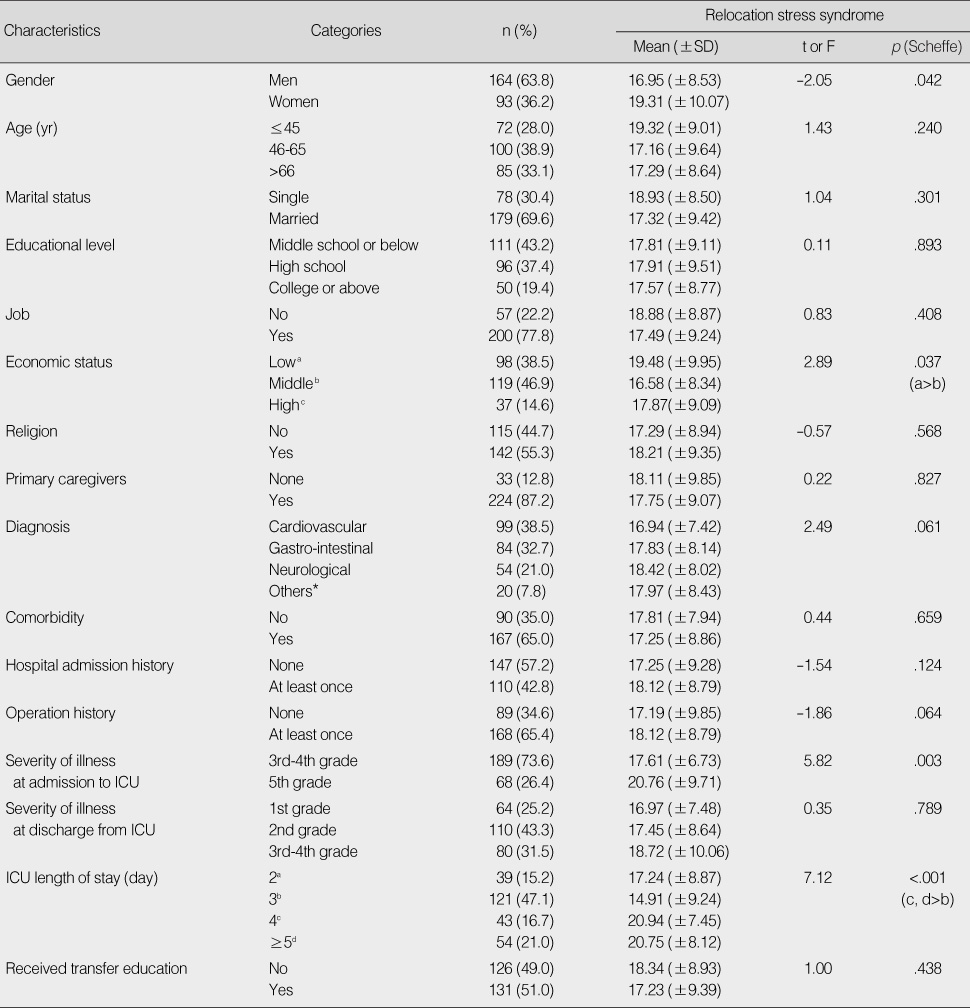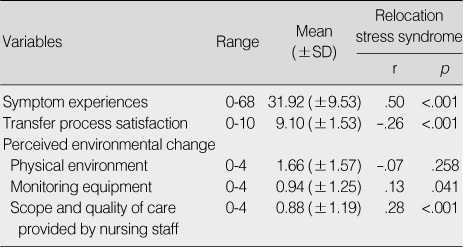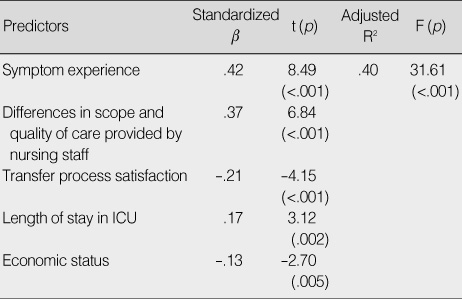Articles
- Page Path
- HOME > J Korean Acad Nurs > Volume 40(3); 2010 > Article
-
Original Article
- Factors Influencing Relocation Stress Syndrome in Patients Following Transfer from Intensive Care Units
- Jin-Hee Park, Moon-Sook Yoo, Youn-Jung Son, Sun Hyoung Bae
-
Journal of Korean Academy of Nursing 2010;40(3):307-316.
DOI: https://doi.org/10.4040/jkan.2010.40.3.307
Published online: June 30, 2010
1Assistant Professor, College of Nursing, Ajou University, Suwon, Korea.
2Professor, College of Nursing, Ajou University, Suwon, Korea.
3Associate Professor, Department of Nursing, Soonchunhyang University, Cheonan, Korea.
4Doctoral Student, College of Nursing, Yonsei University, Seoul, Korea.
- Address reprint requests to: Son, Youn-Jung. Department of Nursing, Soonchunhyang University, 366-1 Ssangyong dong, Cheonan 330-090, Korea. Tel: 82-41-570-2487, Fax: 82-41-575-9347, yjson@sch.ac.kr
Copyright © 2010 Korean Society of Nursing Science
Abstract
-
Purpose
- The purpose of this study was to identify the levels of relocation stress syndrome (RSS) and influencing the stress experienced by Intensive Care Unit (ICU) patients just after transfer to general wards.
-
Methods
- A cross-sectional study was conducted with 257 patients who transferred from the intensive care unit. Data were collected through self-report questionnaires from May to October, 2009. Data were analyzed using the Pearson correlation coefficient, t-test, one-way ANOVA, and stepwise multiple linear regression with SPSS/WIN 12.0.
-
Results
- The mean score for RSS was 17.80±9.16. The factors predicting relocation stress syndrome were symptom experience, differences in scope and quality of care provided by ICU and ward nursing staffs, satisfaction with transfer process, length of stay in ICU and economic status, and these factors explained 40% of relocation stress syndrome (F=31.61, p<.001).
-
Conclusion
- By understanding the stress experienced by ICU patients, nurses are better able to provide psychological support and thus more holistic care to critically ill patients. Further research is needed to consider the impact of relocation stress syndrome on patients' health outcomes in the recovery trajectory.
- 1. Baldwin FJ, Hinge D, Dorsett J, Boyd OF. Quality of life and persisting symptoms in intensive care unit survivors: Implications for care after discharge. Biomed Central Research Notes. 2009;2(160):1–7.PubMedPMC
- 2. Beard H. Does intermediate care minimize relocation stressfor patients leaving the ICU? Nursing in Critical Care. 2005;10:272–278.ArticlePubMed
- 3. Carpentio LJ. Nursing diagnosis: Application to clinical practice. 2000;8th ed. Philadelphia, PA, Lippincott.
- 4. Carr J. Griffiths RD, Jones C. Ward visits after intensive care discharge: Why? In: Intensive Care After Care. 2002;Oxford, Butterworth & Heinemann.
- 5. Chaboyer W, Gillespie B, Foster M, Kendall M. The impact of an ICU liaison nurse: A case study of ward nurses' perceptions. Journal of Clinical Nursing. 2005;14:766–775.ArticlePubMed
- 6. Coyle MA. Transfer anxiety: Preparing to leave intensive care. Intensive and Critical Care Nursing. 2001;17:138–143.ArticlePubMed
- 7. Cutler L, Garner M. Reducing relocation stress after discharge from the intensive therapy unit. Intensive and Critical Care Nursing. 1995;11:333–335.ArticlePubMed
- 8. Erdmann AJ Jr, Brodman K, Lorge I, Wolff HG. Cornell medical index health questionnaire: Outpatient admitting department of the general hospital. Journal of the American Medical Association. 1952;149:550–559.PubMed
- 9. Field K, Prinjha S, Rowan K. 'One patient amongst many': A qualitative analysis of ICU patients' experiences of transferring to the general ward. Critical Care. 2008;12:1–9.
- 10. Gustad LT, Chaboyer W, Wallis M. ICU patients' transfer anxiety: A prospective cohort study. Australian Critical Care. 2008;21:181–189.ArticlePubMed
- 11. Jang YS. Development of admission and discharge criteria in intensive care unit. Journal of Korean Academy of Adult Nursing. 2001;13:291–304.
- 12. Jenkins DA, Rogers H. Transfer anxiety in patientswith myocardial infarction. British Journal of Nursing. 1995;4:1248–1252.ArticlePubMed
- 13. Koh CK. Patients' anxiety in intensive care units and itsrelated factors. Journal of Korean Academy of Nursing. 2007;37:586–593.ArticlePubMedPDF
- 14. Leith BA. Patients' and family members' perceptions of transfer from intensive care. Heart & Lung. 1999;28:210–218.Article
- 15. McGuire BE, Basten CJ, Ryan CJ, Gallagher J. Intensive care unit syndrome: A dangerous misnomer. Archives of Internal Medicine. 2000;160:906–909.PubMed
- 16. McKinney AA, Deeny P. Leaving the intensive care unit: A phenomenological study of the patient's experience. Intensive and Critical Care Nursing. 2002;18:320–331.ArticlePubMed
- 17. McKinney AA, Melby V. Relocation stress in critical care: A review of the literature. Journal of Clinical Nursing. 2002;11:149–157.ArticlePubMed
- 18. Nam HC. Study of Cornell's medical index: The third. Modern Medicine. 1965;3:471–475.
- 19. Nunnally JC. Psychometric theory. 1978;New York, NY, McGraw-Hill.
- 20. Odell M. The patients' thoughts and feelings about their transfer from intensive care to the general ward. Journal of Advanced Nursing. 2000;31:322–329.ArticlePubMed
- 21. Paul F, Hendry C, Cabrelli L. Meeting patient and relatives' information needs upon transfer from intensive care unit: The development and evaluation of an information booklet. Journal of Clinical Nursing. 2004;13:396–405.ArticlePubMed
- 22. Roberts SL. Roberts L. Transfer Anxiety. In: Behavioral concepts and theocratically ill. 1976;Englewood Cliffs, NJ, Prentice-Hall. 224–253.
- 23. Son YJ. Development of relocation stress syndrome (RSS) scale for patients transferred from intensive care unit of general ward. Journal of Korean Clinical Nursing Research. 2008;14:139–150.
- 24. Ssarmann L. Transfer out of critical care: Freedom or fear? Critical Care Nursing Qualiy. 1993;16:78–85.
- 25. Strahan EH, Brown RJ. A qualitative study of the experiences of patients following transfer from intensive care unit. Intensive and Critical Care Nursing. 2005;21:160–171.ArticlePubMed
- 26. Watts R, Gardner H, Pierson J. Factors that enhance or impede critical care nurses' discharge planning practices. Intensive and Critical Care Nursing. 2005;21:302–313.Article
- 27. Watts R, Pierson J, Gardner H. An insight into critical care nurses' beliefs about the discharge planning process: A questionnaire survey. International Journal of Nursing Studies. 2005;43:269–279.ArticlePubMed
- 28. Wesson JS. Meeting the informational, psychosocial and emotional needs of each ICU patient and family. Intensive and Critical Care Nursing. 1997;13:111–118.ArticlePubMed
- 29. Whittaker J, Ball C. Discharge from intensive care: A view from the ward. Intensive and Critical Care Nursing. 2000;16:135–143.ArticlePubMed
- 30. Yang JH. Experiences of admission for critically ill patientsin ICU. Journal of Korean Academy of Adult Nursing. 2008;20:149–162.
REFERENCES
Figure & Data
REFERENCES
Citations

- A phenomenological study on the experiences of patient transfer from the intensive care unit to general wards
Eun-Young Lee, Jin-Hee Park, Alvisa Palese
PLOS ONE.2021; 16(7): e0254316. CrossRef - Development and psychometric evaluation of the Relocation Stress Syndrome Scale-Short Form for patients transferred from adult intensive care units to general wards
Mi Hwa Won, Youn-Jung Son
Intensive and Critical Care Nursing.2020; 58: 102800. CrossRef - Development and Effects of a Transition Nursing Program for Patients and Family Caregivers at a Neurological ICU in Korea
Sun Hee Yun, Eui Geum Oh, Yang Sook Yoo, So Sun Kim, Yeon Soo Jang
Clinical Nursing Research.2017; 26(1): 27. CrossRef - The Effects of Aromatherapy on Intensive Care Unit Patients’ Stress and Sleep Quality: A Nonrandomised Controlled Trial
Eun Hee Cho, Mi-Young Lee, Myung-Haeng Hur, Nativ Dudai
Evidence-Based Complementary and Alternative Medicine.2017;[Epub] CrossRef - A tailored relocation stress intervention programme for family caregivers of patients transferred from a surgical intensive care unit to a general ward
Seul Lee, HyunSoo Oh, YeonOk Suh, WhaSook Seo
Journal of Clinical Nursing.2017; 26(5-6): 784. CrossRef - Clinical validity of a relocation stress scale for the families of patients transferred from intensive care units
HyunSoo Oh, Seul Lee, JiSun Kim, EunJu Lee, HyoNam Min, OkJa Cho, WhaSook Seo
Journal of Clinical Nursing.2015; 24(13-14): 1805. CrossRef
Relocation Stress Syndrome of Patients (N=257)
Differences in Relocation Stress Syndrome by Socio-demographic and Illness-related Characteristics (N=257)
*Categories of hepatic, renal and other combined. ICU=Intensive care units.
Correlation among Symptom Experiences, Transfer related Variables and Relocation Stress Syndrome (N=257)
ICU=Intensive care units.
Predictors of Relocation Stress Syndrome (N=257)
ICU=Intensive care units.
*Categories of hepatic, renal and other combined. ICU=Intensive care units.
ICU=Intensive care units.
ICU=Intensive care units.
 KSNS
KSNS
 E-SUBMISSION
E-SUBMISSION




 Cite
Cite

